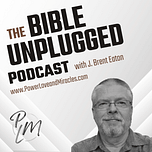Welcome
Hi, I'm Brent and this is the Bible Unplugged podcast. We're starting a series, Advent Unplugged, the stories behind the Christmas story. In this episode, we look at the Messiah's family history to find the saints, sinners, scandals and scoundrels in Jesus' family tree. We'll look at what these things mean to us and share some practical ways to apply these lessons to our lives.
In each episode, we take away the misconceptions and mistranslations of Scripture that can cloud our understanding about what the Bible actually says. My hope is that you'll find something new and interesting in this episode.
When Gospels Collide
Let you know about one of my books that can be helpful as you follow along with the Advent Unplugged.
When Gospels Collide combines the four Gospels into one continuous narrative. As you read through the book you get the details from all of the sources without having to flip back and forth through different book of the Bible.
When Gospels Collide is available on Amazon.
We find ourselves…
• Feeling like we don’t mean much because of our family history or upbringing
• Wonder how God could possibly use us because we don’t seem to have any outstanding characteristics
• God used flawed and sometimes evil people to bring the Messiah into the world.
• There is hope for us yet
What’s so important about the lists
The two accounts of Jesus' family history come from the Gospels of Matthew and Luke. Both accounts are significantly different, but the differences are significant to the whole story. Matthew starts his gospel in chapter 1 with Abraham and goes up until Jesus. This shows the connection to the original covenant. And Matthew being Jewish, it's not surprising he did that.
Luke, however, waits until chapter 3 after Jesus is baptized to give us a list, and it goes in reverse order from Jesus back to Adam. Writing to a primarily Gentile audience, Luke shows that Jesus is connected to everyone in the world. Both of these accounts establish Jesus as the promised Messiah on the throne of David.
Jeremiah prophesies this in chapter 23, verse 5 of his book when he says, Behold, the days come, says the Lord, that I will raise to David a righteous branch, and he will reign as king and deal wisely, and will execute justice and righteousness in the land. We're going to take a look at each account separately, but we're going to point out the differences between the personalities and styles of Matthew and Luke.
Matthew’s scandalous list
Let's start with Matthew. Matthew violates a number of social and cultural norms when he lists several women. This has not done his culture. Some of these women had some kind of tarnish or scandal attached to their names, which shows that God's grace extends to everyone. All of us can be useful in God's plan.
In Matthew 1, verse 3, we find Tamar. God killed off her first two husbands, and she pretended to be a prostitute and seduced her ex-father-in-law Judah.
In verse 5, we find Rahab, who was a prostitute that helped Israel defeat Jericho and became part of the Hebrew nation.
Also in verse 5, we find Ruth. The book of Ruth is a beautiful love story, but Ruth engaged in some risky behavior to get Boaz's attention. And Ruth was David's grandmother.
We have Bathsheba in Matthew 1, verse 6. She and David committed adultery, and David even had her husband killed off to hide the pregnancy. Their first child died immediately after birth, but she became King Solomon's mother. Her name is not mentioned, but she's referred to as the one who had been the wife of Uriah.
Then we come to Mary in chapter 1, verse 16. To most people, she was a rather unremarkable woman in a small town of Nazareth. She was likely about 13 to 15 years old, but she shows incredible strength and tenacity. We will talk about her in a future episode.
Matthew’s precision
To show you the precision of Matthew's list, in verse 17 he says, So all the generations from Abraham to David are fourteen generations, from David to the exile of Babylon fourteen generations, and from the carrying away to Babylon to Christ is fourteen generations.
I have included the lists of names in the shownotes
• Abraham to David- Abraham, Isaac, Jacob, Judah, Perez, Hezron, Ram, Amminadab, Nahshon, Salmon, Boaz, Obed, Jesse, David
• David to the Exile- Solomon, Rehoboam, Abijah, Asa, Jehoshaphat, Jehoram, Uzziah, Jotham, Ahaz, Hezekiah, Manasseh, Amon, Josiah, Jeconiah
• Babylon to Jesus- Shealtiel, Zerubbabel, Abiud, Eliakim, Azor, Zadok, Achim, Eliud, Eleazar, Matthan, Jacob, Joseph, Jesus
Missing names in Matthew
But if Matthew is so precise, why are some names missing?
In the list of names from Babylon to Jesus, there's one name that's not there. Jehoiakim. He was such an evil king that Matthew intentionally blotted his name out and didn't replace him. To give you an idea of what kind of person Jehoiakim was, after he read the first five verses of Jeremiah's book Lamentations, he scratched out all the names of God and burned the rest of the manuscript.
Matthew lists 14 names in the list from David to the exile, but there were more than that. There are three that are missing. Ahaziah, Jehoash, and Amaziah. They were the evil offspring of Ahab and Jezebel, and we've talked about Ahab and Jezebel in some previous episodes. Their names were not registered in the temple as a rebellion against God, and Jewish tradition says because of that, their names are never to be spoken again.
Matthew’s mathematical precision
But Matthew shows a different kind of precision as well. Matthew uses Hebrew math to show God's design behind the names. The Hebrew language uses letters rather than numerals. It was common to calculate the numerical value of words and names to derive a meaning. To give you two examples of the math here, the name David adds up to the number 14, and Abraham adds up to 41. When Matthew lists three sets of 14 generations, he's referring to David, and there are 41 names in the entire list, which refers to Abraham.
• David- DVD [D 4 + V 6 + D 4 = 14]
• Abraham- ‘BRHM [‘ 1 + B 2 + R 20 + H 5 + M 13 = 41]
Luke’s list is different
Let's take a look at Luke's list.
It is different. It goes in reverse order from Jesus to Adam, and as I said, it roots Jesus to all of humanity. There are 77 names in the list, and that number is significant. In Matthew chapter 18, when Jesus is asked how many times we should forgive our neighbor, Jesus says 77 times. Later in history, the theologian Augustine would say that that number is for the forgiveness of sin, which is what the Messiah was here for.
Many names in Luke's list are different than Matthew's. Some Bible critics say this shows that the Bible is in error, but they would be wrong! The lists diverge after David. Luke is following Mary's bloodline. We see this in Luke 3.23 when he says, Jesus himself, when he began to teach, was about 30 years old, being the son, as was supposed, of Joseph, the son of Heli. That really should be translated “a son,” not “the son.” There is no “the” in that manuscript, but every other name in Luke's list has a “the” in front of it. What this means is Luke was acknowledging that, in custom, Joseph was Jesus' father, but in reality, he was a son of Heli. And in that culture, son and grandson were interchangeable.
What do the 2 lists tell us
That Jesus the Messiah is a descendant of David, by blood on Mary's side and by lawful inheritance on Joseph's side. As far as we know, this is the only combination of parents who could fulfill the role at that time in history.
What we learn from this
What may appear to be mistakes or errors in scripture are more discernible when we stop imposing our cultural standards and judgments on the Bible. The books of the Bible were written with incredible skill and careful research guided by the Holy Spirit to give us what we need to know.
God cares for all of us and can use whoever he wants for his purposes. And just because somebody doesn't appear righteous doesn't mean that God can't use them.
Also, God orchestrated the circumstances of Jesus' birth over hundreds of years and many thousands of people. So we don't need to be too concerned about God's timing. God has a plan and he has our back.
How can we apply this
Think about the times you have felt insignificant because of your upbringing or how you've lived your life so far.
Take time in prayer to ask God to show you how much you mean to him and resolve your negative feelings.
We all have parts of our lives we wouldn't want others to know, so be careful how you judge other people. We're all God's children and deserve to be loved and respected.
The coming of the Messiah took hundreds of years and lots of people, so be patient when waiting on God. God's going to show up at the right time.
Also, pay attention to the people and events around you. How is God working in the world and how can you participate?
God has a special plan for you. Seek to learn more about that plan and follow the path in front of you.
The conclusion
Well, the music in the background means I have to quit talking again. I hope this has been helpful. If so, please give this podcast a high rating and share it with others. The early success of The Bible Unplugged is exciting, but I need your help to let other people know about it.
Join me in the next episode when we talk about Zacharias, John the Baptist's father. He showed a character weakness that haunted him for months but taught him, and us, a divine lesson.
My prayer for you is that you will know that you are a priceless creation as a child of God. Have a blessed week.
The disclaimers
And the stuff I keep forgetting. Just to let you know, all opinions are my own. If you agree, keep listening. If you don't, please keep listening. You might learn something new.
All Bible quotations come from the World English Bible, which is in the public domain.
Our show theme song is Awesome Call by Kevin MacLeod and is available under Creative Commons license.
The content of this podcast is copyrighted 2024 by J. Brent Eaton, and this has been a Power, Love, and Miracles production.







Share this post